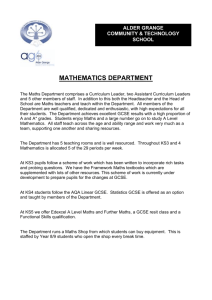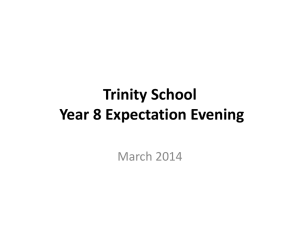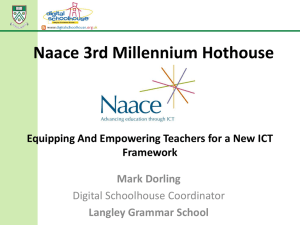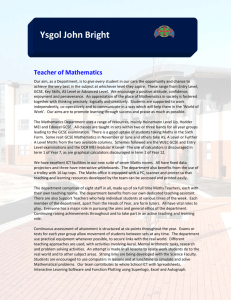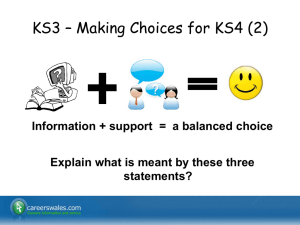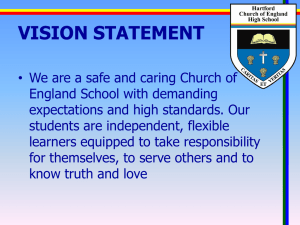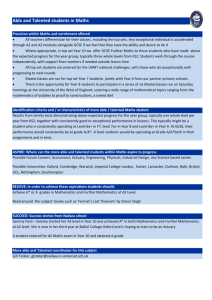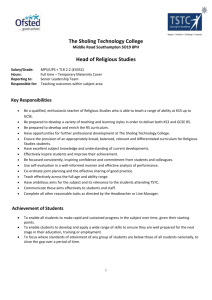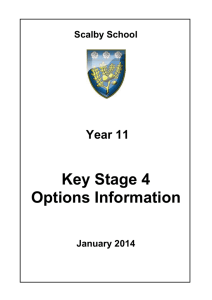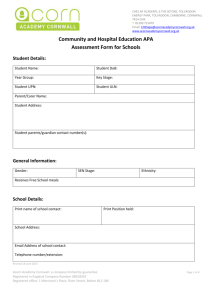Assessment training day
advertisement
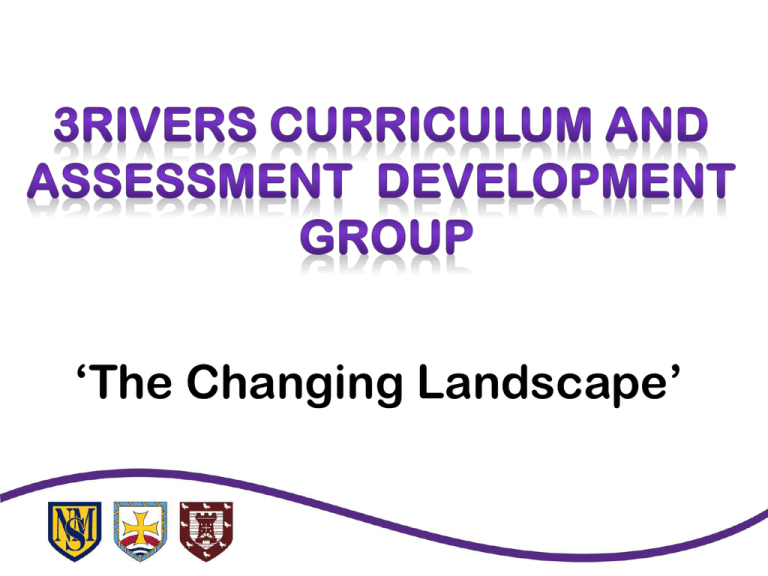
‘The Changing Landscape’ 3Rivers Curriculum Vision ‘To inspire all students across the 3rivers learning trust to become successful learners, through learning a coherent, stimulating and personalised curriculum which celebrates success and encourages all students to maximise their potential’ Key stage 1- 5 Curriculum and Assessment Timeline September 2014 – Introduction of the new national curriculum (Years 1,3,4,5, 7). – Final year of the ‘old’ NC for Year 2 and 6 and final old style KS2 tests in May 2015 September 2015 – Introduction of the new national curriculum (Year 2, 6, 8) – First teaching of new GCSE English Language, English Literature & Maths. – First teaching of 14 new AS/A level specifications – Reception baseline testing available September 2016 – First teaching of new AS/A level and GCSE specifications – First reporting of the new GCSE accountability measures ‘progress 8’ – New KS1 tests administered reported as scaled scores – New KS2 accountability measures introduced reported as scaled scores Our Philosophy Changes to our assessment format and framework are not about reinventing the wheel… …they are about making the wheel turn more smoothly and effectively. Why Assessment Without Levels? • Original purpose • Never meant to be a label • Undue pace • Levels mean different things • Successful nations don’t use them • Articulation of progress The future of assessment • Consistently delivered • Common format and framework • whole-school and subject-specific criteria • Tracking system • Sensitive and constructive Assessment for Progress We are establishing a framework for 2014-15 and beyond to ensure that assessment genuinely supports progressive learning in all subjects PR SS GRE O Newminster and Chantry • Strategic curriculum meetings • Assessment & data meetings • Subject leader meetings • Department meetings Summer 2014 Curriculum jigsaws for Y5 and 7 published to website Training day and other time allocations to facilitate planning Opportunity for HSL/FSL to map Y4-5 and Y8-9 SoW templates agreed and used as a collaborative planning tool Autumn 2014 Subject development plans identify key curriculum priorities Ongoing work on short term and medium term plans SOW on FROG for first term Establish curriculum working parties with a ‘License to innovate’ –small scale projects to trial new cross curricular, enrichment, outdoor learning projects Assessment & curriculum group meetings. Principled assessment design training – Dylan William. Assessment working parties to trial new assessment systems to consider how progress and attainment will be measured. Spring 2015 Curriculum Leaders’ monitor and evaluate plans. Summer 2015 Curriculum Leaders’ review the provision and quality of learning in their subject and identify next steps according to the annual monitoring and evaluation cycle. Start to consider how pupil progress and attainment will be tracked against the new PoS. Moderation of assessments to build up a portfolio Propose and agree reporting methods from September 2015. Autumn 2015 New curriculum taught to Year 6 and 8 Planning ongoing. Spring 2015 Curriculum Leaders’ to ensure plans highlight how key skills are developed in areas such as -reading, writing, mathematics, digital literacy, SMSC and citizenship. Final assessment criteria, recording, tracking and reporting procedures. The first Y6 national assessment of the new National Curriculum. • Based on good points about APP • Uses idea of ‘Threshold Concepts’ • Embedded in planning and marking • Starts with an assessment framework… Learning goals Learning opportunities Use results Assess learning Planning for assessment French model Visible learning approaches The Science Model • When teaching and learning are visible – that is, when it is clear what teachers are teaching and what students are learning, student achievement increases. • As featured in ‘Visible Learning for Teachers’ (Hattie, J. 2012) ways to make learning and teaching more explicit were explored by several schools. Test score % Threshold 75-100 Extended Abstract 50-75 Relational 25-50 0-25 Multi-structural Uni-structural King Edward VI School & Curriculum Change Begin teaching new English and Maths specifications GCSE 2015 All other subjects to focus on KS3 Y9 -2016 Embed new, larger content into KS3 curriculum King Edward VI School & Curriculum Change KS3 2014 Trial and review of ‘skills-based’ models Collaborative work across 3RLT Key if we are going to ensure a consistent approach to our children Assessment without levels training courses attended Research completed into various trials across England To broaden the work of the 3Rivers curriculum group to extend more widely across the partnership. This could include: 1. A fully integrated curriculum from key stage 1-5 2. A common agreed approach to ‘assessing without levels’ key stage 1-3 3. A common agreed approach to recording and reporting student progress key stage 1-3 in SIMS Curriculum area English Maths Music/Art MFL Technology Computer Science Science PE RE/Citizenship Humanities Led by: Jane Sampson Nigel Shields Angela Saxton Michelle Richards Jill Woolley Charlotte Jones Catherine Wilson Rachel Said Andy Cottiss Sue Brown Andrea Ayres Frank Stoker Anne Martin Julie Edwards Rachel Bowler Sumeena Razzaqi Tom Jackson Ian Dick Craig Little Lynsey Jackson Manjit Perkins Stef Buckton Simon Daniell Room allocation Chantry Hall The Hub R7 R11 R5 R12 Science Lab (17) R2 R4 R13
